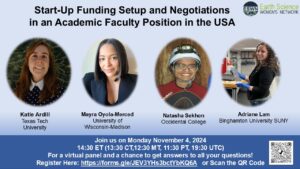Start-Up Funding Setup and Negotiations in an Academic Faculty Position in the USA
The Earth Science Women’s Network will be hosting a webinar on November 4, 2024, at 14:30 Eastern Time (19:30 UTC) to answer all these questions and many others. A panel of assistant professors who are in tenure track positions within multiple earth science disciplines will share their experience and “lessons learned”, and answer your questions. This workshop is geared towards graduate students and post-docs considering an academic career in the US.
We will be joined by:
- Katie Ardill (Assistant Professor Texas Tech University)
- Mayra Oyola-Merced (Assistant Professor University of Wisconsin–Madison)
- Natasha Sekhon (Assistant Professor, Occidental College)
- Adriane Lam (Assistant Professor, Binghamton University SUNY)
There will also be an opportunity to network with our speakers after the panel discussion.
Register here: https://forms.gle/npiG82SGCZFrGj2F7
Hope to e-see you soon!
Speaker Bios
Katie Ardill, Texas Tech University
Katie is an Assistant Professor in the Department of Geosciences at Texas Tech University. She has a BSc in Geology from Durham University, UK, and a PhD in Geological Sciences from the University of Southern California. She was an Assistant Professor in the Geology Department at California State University, Sacramento for two years before joining Texas Tech in 2022.
Katie’s research in igneous petrology focuses on the evolution of continental arc systems, where magmatic and tectonic processes are closely linked. Katie’s research group studies patterns of continental arc magmatism at many scales to explore the spatial and temporal record of arc evolution and continental crust formation, the connection between volcanic and plutonic rocks, and magma chamber processes. Katie and her group combine a range of tools that complement fieldobservations, including structural and microtextural analyses, U-Pb zircon geochronology, and geochemistry of rock samples and minerals. Her recent work includes tracing the geochemical signals of long-lived basement inheritance and episodic arc processes in the Sierra Nevada, CA to build on our understanding of the Mesozoic arc through time (Ardill et al., 2024 GSA Bulletin), as well as working with students on developing new 1:10,000 scale geologic maps of Sierra Nevada roof pendants through the USGS EDMAP program.
Mayra Oyola-Merced, University of Wisconsin-Madison
Dr. Mayra Oyola-Merced is an Assistant Professor at the Department of Atmospheric and Oceanic Sciences and the University of Wisconsin-Madison. Her research focuses onimproving space-borne observation capabilities and how these datasets are used in atmospheric modeling. She was a Scientist at the NASA Jet Propulsion Laboratory and served as the Deputy Director of the International GNSS Service (IGS), where she oversaw a federation of over 250 organizations. She is currently a member of the Associate Board of Directors of ESWN, a Governing Board Member to the IGS, among many others.
Natasha Sekhon, Occidental College
Natasha is an Assistant Professor in the Department of Geology at Occidental College, a liberal arts college in Los Angeles, CA. She received her B.S. in Earth System Sciences from UC Irvine, MS and PhD from the Jackson School of Geosciences at the University of Texas, Austin. She completed her postdoctoral work at the Institute at Brown for Environment and Society and Department of Earth, Environmental, and Planetary Sciences at Brown University. A low- temperature geochemist and paleoclimatologist, Natasha Sekhon’s research combines concepts from karst and speleothem sciences to investigate the hydroclimate of terrestrial environments varying on seasonal to millennial time scales. Her research primarily focuses on understanding mechanisms driving cycles of climate change in terrestrial environments. She is particularly interested in the interplay between hydroclimate extremes, floods and droughts, during the instrumental period (1950s – Present), near-past (Quaternary), and future (circa 2100 CE) landscapes.
Adriane Lam, Binghamton University SUNY
Adriane is an Assistant Professor in the Department of Earth Sciences at Binghamton University. She received her BS in Geology from James Madison University, MS from Ohio University, and PhD from University of Massachusetts Amherst. She conducts research in three main areas: paleontology, paleoceanography, and science communication. Her main loves are the early Paleozoic and the Neogene, where she studies paleobiogeographic patterns of marine invertebrates, planktic foraminiferal biostratigraphy and taxonomy, and reconstructing warm water surface currents across analogue warm periods. To date, she has been involved with three International Ocean Discovery Program (IODP) expeditions. Adriane is also the co-founder and co-President of Time Scavengers, an educational non-profit organization.

